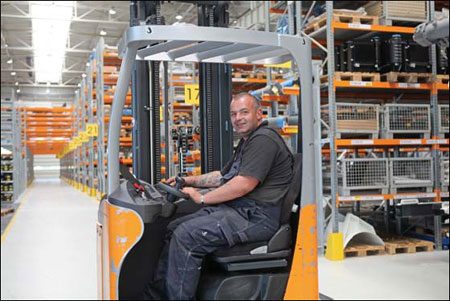Game changers
Updated: 2012-12-07 09:02
By Fu Jing, Zhang Chunyan and Li Xiang (China Daily)
|
|||||||||||
|
Top: Johan Cheval, account manager of Hainan Airlines Brussels Office, with the office's general manager Chen Mingqiong. Above: A German worker in the workshops invested by Sany Heavy Industry in Germany. Fu Jing / China Daily |
While the job opportunities offered by Chinese employers does add the extra sheen to an already resplendent German labor market, other EU member states are leaving no stone unturned to attract additional investment from Chinese companies.
Sources from Invest in France Agency (AFII), a government body that promotes and facilitates foreign investment in France, says that the total value of China's investment in France reached $1.8 billion by the end of 2011 and created more than 6,000 jobs.
In 2011, 17 job-creating investment projects were announced to generate 696 jobs in France, making China France's 10th largest investor.
The business activities prioritized by Chinese companies were decision-making centers (35 percent) and production/manufacturing units (30 percent). A majority of Chinese investments involved site creations (71 percent). In 2011, six new investment projects from Hong Kong Special Administrative Region were set up and they led to the creation of 318 jobs in France. There are about 60 HKSAR subsidiaries in France, employing more than 6,100 people.
In 2011, France was the third-largest recipient of job-creating investment from China, hosting 13 percent of Chinese projects in Europe. With 15 percent of investment projects, Germany was the leading recipient of Chinese investment projects on the continent, followed by the UK, which attracted 14 percent of these investments.
|
||||
Commercial Aircraft Corp of China, which specializes in designing and manufacturing civil aircraft, decided to locate its European headquarters in the Paris region. Twenty new jobs are likely to be created by the company.
Rotam Cropsciences Ltd, a HKSAR firm which specializes in distributing, marketing, manufacturing and R&D in phytosanitary and veterinary products, has decided to expand its Rotam Agrochemical Europe site in the Rhone-Alpes region, to focus on producing insecticides, fungicides, growth regulators and plant and animal nutrients. The investment project will create another 20 jobs.
Old favorite
The UK has always enjoyed a special bonding with Chinese companies and was one of the destinations actively pursued during the early years of outbound investment. Though others have overtaken it in the investment race, it still remains an active destination.
The UK is now home to more than 400 companies from the Chinese mainland, according to the UK Trade and Investment. Chinese investment in the UK has increased from virtually zero during the 1970s to more than $2.3 billion last year, says Liu Xiaoming, China's ambassador to the UK.
In September, Chinese telecoms and computer network giant Huawei Technologies announced that it would invest and create more jobs in the UK as part of its overall expansion plan in Europe.
Huawei employs 800 people in the UK and plans to increase that to 1,500 over the next five years as part of the 1.3 billion pound investment and procurement program in Britain.
British Prime Minister David Cameron said the investment demonstrated that the UK is "open for business" to Chinese companies.
"I welcome this and I want to see more companies invest in the UK as we work to achieve sustainable and balanced growth within our economy," Cameron said.
Victor Zhang, chief executive of Huawei Technologies UK, had termed the investment "the beginning of an exciting new period of development".
Huawei first came to the UK in 2001 and the company will move its headquarters from the current offices in Basingstoke to Green Park in Reading by April 2013.
"Huawei is providing important investments in the UK and creating hundreds of new jobs for Reading and Green Park, demonstrating once again that Reading is an economic powerhouse in the South East," Reading West Member of Parliament Alok Sharma says.
Today's Top News
Rescuers race against time for quake victims
Telecom workers restore links
Coal mine blast kills 18 in Jilin
Intl scholarship puts China on the map
More bird flu patients discharged
Gold loses sheen, but still a safe bet
US 'turns blind eye to human rights'
Telecom workers restore links
Hot Topics
Lunar probe , China growth forecasts, Emission rules get tougher, China seen through 'colored lens', International board,
Editor's Picks

|

|

|

|

|

|









